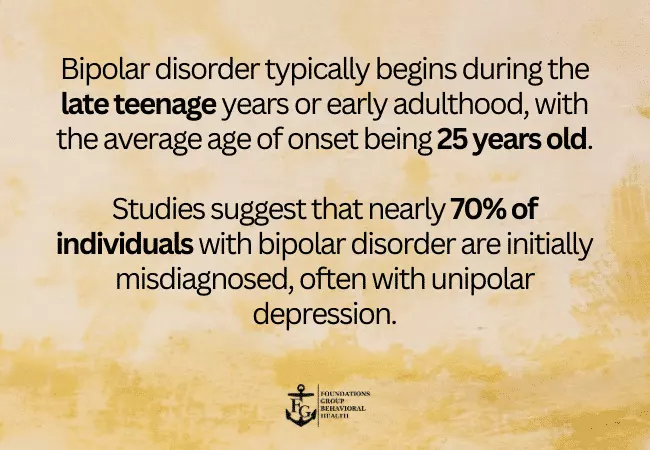Bipolar disorder is a serious mental health condition characterized by extreme shifts in mood, energy, and behavior. These fluctuations can range from intense highs, known as manic episodes, to debilitating lows, referred to as depressive episodes. Understanding the red flags of bipolar disorder is essential for identifying the condition early and ensuring timely intervention. At Foundations Group Behavioral Health, we provide compassionate, evidence-based care through programs such as Psychiatric Day Treatment, Half Day Treatment Programs, and our specialized Bipolar Disorder Treatment Programs to support individuals and families dealing with this complex condition.
What is Bipolar Disorder?
Bipolar disorder, formerly called manic-depressive illness, affects an individual’s ability to regulate their emotions and behavior. The condition is often misunderstood, which can lead to delays in diagnosis and treatment. While occasional mood swings are normal, bipolar disorder involves extreme and persistent changes in mood that interfere with daily life, relationships, and work.
At its core, bipolar disorder manifests through two distinct mood states:
- Manic Episodes: Periods of abnormally high energy, euphoria, or irritability.
- Depressive Episodes: Periods of low energy, hopelessness, and deep sadness.
There are also mixed episodes where symptoms of mania and depression occur simultaneously, making the condition even more challenging to manage without professional support.
Types of Bipolar Disorder
Bipolar disorder is not a one-size-fits-all condition. It encompasses several types, each with its own unique characteristics. Understanding these distinctions can help individuals and families recognize symptoms and seek appropriate care:
- Bipolar I Disorder:
This type involves intense manic episodes lasting at least seven days or requiring hospitalization. Depressive episodes often follow, lasting two weeks or more. Bipolar I is characterized by extreme mood swings that can significantly disrupt daily life. - Bipolar II Disorder:
This type includes less severe manic episodes, known as hypomania, alongside longer and more persistent depressive episodes. While the highs are not as extreme, the depressive episodes can still be profoundly debilitating. - Cyclothymic Disorder (Cyclothymia):
Individuals with cyclothymic disorder experience numerous periods of hypomanic and depressive symptoms that last for at least two years but are less severe than in Bipolar I or II. These mood changes may feel more “mild” but can still interfere with life if left untreated. - Other Specified and Unspecified Bipolar Disorders:
These include bipolar symptoms that do not fit neatly into the above categories. These cases can still cause significant distress and require expert evaluation and treatment.
Red Flags to Watch Out For
1. Symptoms of a Manic Episode
Manic episodes often seem like a burst of unusual energy and confidence, but they can lead to impulsive decisions and risky behaviors. Key signs include:
- Excessive Energy and Activity: Individuals may feel a sudden surge of energy, becoming excessively active or hyper-productive.
- Grandiosity: Unrealistic beliefs in one’s abilities, such as thinking they can accomplish impossible tasks.
- Racing Thoughts and Rapid Speech: Difficulty keeping up with their own thoughts, leading to fast and often disorganized speech.
- Impulsivity: Engaging in high-risk behaviors, such as reckless spending, substance use, or unsafe sexual activities.
- Reduced Need for Sleep: Feeling rested after only a few hours of sleep, or skipping sleep altogether, without feeling tired.
- Irritability or Aggression: Although some people experience euphoria during mania, others may become highly irritable or even hostile.
While these behaviors may seem productive or exciting initially, they often spiral out of control and result in strained relationships, financial problems, or health risks.
2. Symptoms of a Depressive Episode
The depressive phase of bipolar disorder can be just as intense as mania but is marked by an overwhelming sense of sadness or hopelessness. Warning signs include:
- Persistent Sadness: Feeling deeply sad, empty, or hopeless for prolonged periods.
- Loss of Interest: A noticeable lack of interest or pleasure in previously enjoyed activities.
- Extreme Fatigue: Feeling exhausted or lethargic, even after adequate sleep.
- Appetite and Weight Changes: Significant changes in appetite, leading to weight gain or loss.
- Difficulty Concentrating: Trouble focusing on tasks or making decisions, often described as “brain fog.”
- Thoughts of Self-Harm or Suicide: A frequent and dangerous symptom of depressive episodes that requires immediate intervention.
3. Mixed Episodes
Mixed episodes involve symptoms of both mania and depression at the same time. For instance, someone may feel hopeless while experiencing heightened energy and agitation, increasing their risk for self-harm or impulsive behaviors.
4. Mood Swings Beyond the Norm
Occasional mood swings are normal, but bipolar disorder is characterized by intense and prolonged mood changes that are far more disruptive. These shifts often occur without a clear trigger and interfere with daily responsibilities, relationships, and personal goals.
5. Disruptions in Sleep Patterns
Changes in sleep patterns are common with bipolar disorder and can help identify the type of episode an individual is experiencing:
- During Mania: Individuals may feel they don’t need sleep or go days with minimal rest.
- During Depression: Excessive sleeping or insomnia is common, often leaving the person feeling unrefreshed.

Challenges of Living with Bipolar Disorder
Bipolar disorder presents unique challenges that affect various aspects of an individual’s life:
- Maintaining Relationships: The unpredictable mood swings of bipolar disorder can strain relationships with family, friends, and colleagues. Manic episodes may lead to impulsive behaviors that damage trust, while depressive episodes can cause withdrawal and isolation.
- Workplace Difficulties: Managing bipolar disorder in a professional setting can be tough. Sudden mood changes may disrupt productivity, cause absenteeism, or lead to conflicts at work.
- Financial Instability: Impulsive spending during manic episodes can lead to financial problems, further adding stress during depressive episodes.
- Physical Health Issues: Changes in sleep patterns, poor diet, and neglect of personal health during episodes can lead to long-term physical health problems.
- Stigma and Misunderstanding: Many people with bipolar disorder face judgment and misunderstanding from others, making it harder to seek help or share their experiences.
Why Identifying These Signs is Critical
Untreated bipolar disorder can have severe consequences, including relationship breakdowns, financial troubles, and even increased risk of self-harm. Early recognition of these symptoms can pave the way for effective treatment and improved quality of life. Foundations Group Behavioral Health offers comprehensive care through our Behavioral Health Treatment Programs to help individuals manage their symptoms and regain stability.
The Role of Family and Friends
The support of loved ones plays a crucial role in helping someone manage bipolar disorder. While it can be challenging, families and friends can provide invaluable assistance:
- Encourage Professional Help: Recognizing symptoms and encouraging your loved one to seek treatment is a vital first step. Programs like our Half Day Treatment Program provide structured care while allowing individuals to remain connected to their support networks.
- Learn About Bipolar Disorder: Educating yourself about the condition can help you understand what your loved one is experiencing. This knowledge can guide you in offering empathy and reducing frustration.
- Recognize Triggers and Warning Signs: Be aware of what may trigger mood episodes and learn to identify early signs of mania or depression. Early intervention can prevent episodes from escalating.
- Offer Practical Support: Help with tasks such as scheduling appointments, managing medications, or ensuring they maintain a routine can be invaluable, especially during depressive episodes.
- Set Boundaries: While supporting your loved one is important, setting boundaries ensures you maintain your well-being and avoid burnout.
How Foundations Group Behavioral Health Can Help
At Foundations Group Behavioral Health, we understand the complexities of bipolar disorder and the toll it can take on individuals and their families. We provide a variety of tailored treatment options, including:
- Psychiatric Day Treatment: A structured, intensive program offering daily therapeutic support while allowing individuals to return home each evening.
- Half Day Treatment Program: A more flexible option for those needing significant support without committing to a full-day program.
- Outpatient Mental Health Program: Designed for ongoing care and support, helping individuals maintain stability while addressing life’s challenges.
- Bipolar Disorder Treatment Programs: Specialized care using evidence-based approaches like cognitive-behavioral therapy (CBT), dialectical behavior therapy (DBT), and medication management.
- Depressive Disorder Treatment Programs: Targeted interventions for managing the depressive phase of bipolar disorder or standalone depression.
The Road to Recovery
Bipolar disorder is a lifelong condition, but it is manageable with the right treatment and support. Through our specialized Behavioral Health Treatment Center in Massachusetts, individuals can access expert care that helps them achieve stability and thrive.
When to Seek Help
If you or a loved one are exhibiting the symptoms outlined above, don’t wait to seek professional assistance. Early intervention is critical for minimizing the impact of bipolar disorder and restoring balance to life. Foundations Group Behavioral Health is here to guide you through every step of your recovery journey. Contact us today at 508.388.5324 to book your first session and begin your journey toward a more mindful future.
FAQ How to Tell If Someone Is Bipolar
What are the common symptoms of bipolar disorder?
Bipolar disorder symptoms include extreme mood swings, such as manic episodes characterized by high energy and impulsivity, and depressive episodes marked by sadness, fatigue, and low motivation.
How is bipolar disorder diagnosed?
A licensed mental health professional evaluates symptoms, medical history, and family history. A thorough assessment at a Behavioral Health Treatment Center in Massachusetts can provide an accurate diagnosis.
Can bipolar disorder be treated without medication?
While therapy and lifestyle changes are essential, medication is often recommended to stabilize mood swings. Treatment is tailored to individual needs and may include a combination of therapy, medication, and structured programs like Psychiatric Day Treatment.
How can family members support someone with bipolar disorder?
Family members can offer support by learning about the condition, recognizing early signs of mood episodes, and encouraging their loved one to seek treatment through programs like the Bipolar Disorder Treatment Program.
Is bipolar disorder a lifelong condition?
Yes, bipolar disorder is a chronic condition, but with the right treatment and support, individuals can lead fulfilling lives. Programs such as the Outpatient Mental Health Program can help manage symptoms effectively.








